
|
||||
|
||||
|
Saturday, January 24, 2009
Vatican lifts excommunications on SSPX hierarchy; Bishop Bernard Fellay and District Superior for Germany apologize for Richard Williamson's remarks
From Vatican Radio comes the news that Holy See today has lifted the excommunications of the four bishops of the SSPX by a decree of the Congregation for Bishops.
Amy Welborn offers a good assessment of the situation and a roundup of responses to the Vatican's move -- among them the helpful post from the clerical blog Rationabile Obsequium (What precisely has the Pope done?) and this analysis from Carlos Palad of Rorate Caeli; a good aid in discerning what this means (an invitation to reconciliation with the Catholic Church); and more importantly what it does not ("The lifting of the excommunications on the SSPX bishops does not signify that the SSPX is back in full communion with the Holy See"). The ball is now in the SSPX's court.
Earlier this month, SSPX Bishop Williamson gave an interview to the Swedish press, in which he espoused his oft-repeated view that none of [the Jews] died as a result of gas in gas chambers." Williamson has previously endorsed the anti-semitic forgery Protocols of the Elders of Zion ("God put into men's hands the Protocols of the Sages of Sion... if men want to know the truth, but few do") and has asserted that the Jews are fighting for world domination "to prepare the Anti-Christ's throne in Jerusalem." In the past, he has also indulged in 9/11 conspiracy theorizing and denounced Vatican II as "the religion of man, of man put in the place of God ... it's a new religion, dressed up to look like the Catholic religion, but it's not." (See Catholic Herald March 5, 2008) and "The Politics of Bishop Richard Williamson" (Fringewatch January 25, 2006). I fear that the Pope's gesture will not go over well with the Jewish people or those sympathetic to the betterment of Christian-Jewish relations. Some will see the lifting of excommunication without a concurrent demand for a change of mind and heart on the part of avowed anti-semites like Williamson as a tacit acceptance. Writing to Cardinal Kasper, President of the Pontifical Commission on Religious Relations With the Jews, Abraham Foxman of the Anti-Defamation league expressed his concern that lifting Bishop Williamson's excommunication "could become a source of great tension between Catholics and Jews.": "The re-admittance to full communion of a bishop who appears to publicly reject key teachings of the Second Vatican Council could provide succor to those whose views threaten the Jewish people and the Church's desire to improve and deepen its relationship with us to benefit all mankind." From my understanding Williamson's views have scandalized some within the SSPX; however, Bishop Fellay has taken a 'hands off' approach in his handling of the controversy. In a stern reply to the Swedish television studio, he castigated them for their "vile attempts" to question Williamson's views on the Holocaust, stating: It is obvious that a bishop can only speak about questions of faith and morals with any ecclesial authority. If he deals with secular issues he is personally responsible for his own private opinions. The Society I am governing has no authority to address such issues, or will it ever claim such authority.No doubt that if the SSPX has any desire to reconcile with Rome, particularly after Pope Benedict's significant gesture in their direction, they will have to confront the obstacle of Bishop Richard Williamson.
Labels: benedict, extremism, traditionalism
Sunday, January 20, 2008
Pope Benedict, Sapienza University and the Intolerance of Radical Secularism
La Sapienza University is the largest European university and the most ancient of Rome's three public universities. It was founded in 1303 by Pope Boniface VIII -- in 1870, it was secularized and became the university of the capital of Italy. [Source: Wikipedia]. This year, Pope Benedict XVI was scheduled to speak to 1,000 hand-picked guests in the Aula Magna, the main lecture hall, at the inauguration of the academic year.
A hundred militant left wing students had occupied the office of Professor Renato Guarini, the university rector, to demand that the papal visit be cancelled because of Benedict's "obscurantist" stand on science in general and the Church's treatment of Galileo as a heretic in particular. Sixty-seven science professors and lecturers at La Sapienza signed a letter to Professor Guarini calling on him to scrap the visit. Professor Guarini said the Pope was "saddened" by the protests. 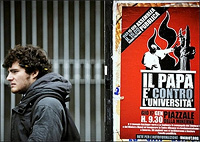 According to Reuters: According to Reuters:. . . The first day on Monday revolved around an "anti-clerical" meal of bread, pork and wine and a banner reading: "Knowledge needs neither fathers nor priests". In defense of Galileo?
In their letter the La Sapienza scientists, including Andrea Frova, author of a study of Galileo, and Carlo Maiani, the head of the Italian National Council for Research, said they felt "offended and humiliated" by a statement made in 1990 by the then Cardinal Joseph Ratzinger suggesting the trial of Galileo for heresy because of his support for the Copernican system was justified in the context of the time.Unfortunately, the Times reporting (which is indicative of the understanding of the Sapienza faculty) is factually incorrect and reveals a gross misunderstanding of what Ratzinger actually said. 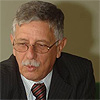 From L'Osservatore Romano, Professor Giorgio Israel (translation by the Papa Ratzinger Forum): From L'Osservatore Romano, Professor Giorgio Israel (translation by the Papa Ratzinger Forum):They accuse him of having said - in a lecture he gave at La Sapienza on February 15, 1990 {cfr J. Ratzinger, Wendezeit für Europa? Diagnosen und Prognosen zur Lage von Kirche und Welt, Einsiedeln-Freiburg, Johannes Verlag, 1991, pp. 59 e 71) - a statement that was actually from the philosopher of science, Paul Feyerabend: "In the time of Galileo, the Church was much more faithful to reason than Galileo himself. The trial of Galileo was reasonable and just."As John Allen Jr. remarks: In a nutshell, therefore, Benedict is being faulted by the physics professors for quoting somebody else's words, which his full text suggests he does not completely share. (Readers who remember Regensburg can be forgiven a sense of déjà-vu.) Also by way of John Allen, Jr., the comments by then-Cardinal Joseph Ratzinger on the Galileo case, excerpted from Benedict cancels -- and turns the tables on Sapienza protestors January 16, 2008
Esteemed Rector,the Holy Father had gladly accepted your invitation to visit the Università degli Studi "La Sapienza", to offer in this way a sign of affection and of the high regard in which he holds this illustrious institution, which originated centuries ago at the behest of his venerated predecessor. From AsiaNews.it, translation of the speech Benedict XVI planned to deliver Thursday at La Sapienza University in Rome.. According to Zenit News Service, Benedict's address was read by another professor during the inauguration, to much acclaim: During the inauguration ceremony, a professor read the discourse the Holy Father had prepared for the occasion. A standing ovation and students' shouts of "Long live the Pope" followed the reading. Meanwhile, Italian leaders voiced their dismay at the Pope's cancellation (Catholic World News): Italian president Giorgio Napolitano released a statement condemning the "inadmissible intolerance" shown by the campus protestors, who had planned to greet the Pope with loud rock music, anti-clerical posters, and parades of militant homosexuals. Prime Minister Romano Prodi said that the protests had "provoke unacceptable tensions and created a climate that does not honor Italy's traditions of civility and tolerance."
"So there are three places where the pope cannot go: Moscow, Beijing, and the university of Rome", commented one of the young people present at the audience. "If Benedict does not go to La Sapienza, La Sapienza comes to Benedict", read one of the banners that the young people raised. January 17, 2008
"Next Sunday's event will be a moment of prayer, any other motivation in the people joining us at St. Peter's Square would be unwelcome and out of place," Cardinal Ruini told the Vatican daily L'Osservatore Romano. In an interview with 'Corriere della Sera, Ruini also remarked that "some signs of solidarity" with the Pope by attendees of Sappienza University had come too late. January 18, 2008
 Commentary
Labels: benedict, extremism, ratzinger, secularism
Tuesday, January 08, 2008
George Weigel's "Faith, Reason & The War against Jihadism" (Part 1)
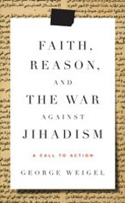 Weigel begins Faith, Reason and the War Against Jihadism with the basic observation that the overwhelming majority of humanity receives the narrative for life from religious convictions, and for whom religion constitutes a (or, rather, the) dynamic force. To put it another way (borrowing a familiar phrase from American conservatism:) "ideas have consequences." Failure to understand this, warns Weigel, is to commit a kind of "conceptual self-sabotage." Weigel begins Faith, Reason and the War Against Jihadism with the basic observation that the overwhelming majority of humanity receives the narrative for life from religious convictions, and for whom religion constitutes a (or, rather, the) dynamic force. To put it another way (borrowing a familiar phrase from American conservatism:) "ideas have consequences." Failure to understand this, warns Weigel, is to commit a kind of "conceptual self-sabotage."
Criticizing the notion of "the inevitable progress of history" which holds many in its sway ("a hypothetical, not a given"), Weigel intends this book as a wake-up call, a reminder that the very future of the West rests not upon material or technological wealth but "whether our spiritual aspirations are noble or base." He sets out "to identify what we should have learned, since September 11, 2001: about our enemy, about us -- and about what must be done to see us through to a future safe for freedom." Writign for a popular audience, he offers 15 brief lessons categorized in three sections: 'Understanding the Enemy', 'Rethinking Realism' and 'Deserving Victory.' I'm going to divide my post into two parts -- I'll begin by presenting Weigel's diagnosis of the problem (understanding of "the Enemy"), and offering my impressions; in a later post I plan to review the 2nd and 3rd parts (essentially Weigel's prescription in the form of recommmendations for foreign policy). Read More
"Understanding the Enemy"
Weigel challenges the facile equasion of Christianity, Judaism and Islam as "people of the Book" or "the three Abrahamic faiths." To do so, he contends, obscures the very different characterization and roles assigned to Moses and Jesus in Islamic theology, not to mention the unique nature of Muslim's reverence for the Qur'an.
The focal point of this differentiation is Islamic theological supersessionism: Islam's conviction of itself as the final revelation and a necessary corrective to Judaism and Christianity in such a way that, while "no orthodox Christian holds that God's self-revelation in Christ negates God's self-revelation in the history of the People of Israel," Islam, by contrast, "trumps . . . any prior revelatory value that might be found in the Hebrew bible or the New Testament." [p. 20-21].
Consequentially, Islam has built into its theology a "dynamic of conflict" with Judaism and Christianity. However, while the history of Islamic-Christian relations has been one of "almost continuous conflict", Weigel does not think this inevitable ("it should not be thought that Islamic supersessionism necessarily requires violent conflict"). [p. 21]
Another common mistake, according to Weigel, is believing Islam's understanding of the Qur'an as analogous to our understanding of the Christian scriptures: Another important distinction between Muslims and Christians is the Islamic conception of God, and its consequences for each tradition's "theological anthropology." Weigel turns to the French historian Alain Bensacon ("What Kind of Religion is Islam" Commentary May 2004), who observes that: In Christian theology we perceive an analogy between God and humanity: men and women are bound to God by speech and argument; in Genesis, Adam names the animals, thereby participating in the divine work of the Creator. To act rationally is to reflect the Father (Here one is reminded of Benedict's citation of Manuel II in his Regensburg Address: "Not to act reasonably, not to act with logos, is contrary to the nature of God"). According to Weigel, such a conception is not to be found in the world of Islam, whose anthropology is governed instead by "submission to the majesy of God, who neither begets nor is begotten."
What are the consequences of this differentation in conceptions? Whom, or what, are we fighting?
Weigel moves on to a proper identification of the enemy with which we are engaged: jihadism - best distinguished from other forms of Islamism by its messianic political aspirations, demanding nothing less than a global Islamic state. Weigel quotes Fr. Neuhaus: To understand jihadism and what motivates these terrorists, one must grasp its intellectual history. Weigel locates this in the writings of several prominent Muslim figures:
Wahab emphasized the radical unicity (oneness) and lordship of God, the absolute lawgiver, and in relation to whom there is only submission: Sayiid Qutb's writings were promoted by his brother Mohammad, a professor of Islamic studies in Saudi Arabia. One of his students, Ayman Zawahiri, would become a mentor to Osama bin Laden and a leading figure in Al Qaeda. (For more on Qutbe, see Paul Berman's "The Philosopher of Islamic Terror" New York Times Magazine, March 23, 2003.)
What is important, says Weigel, is to read history and politics "through the prism of jihadist theological convictions." The "generally feckless" response by the United States to attacks on U.S. embassies in Kenya and Tanzania in 1998 and the bombing of the U.S.S. Cole in 2000 spurred Bin Laden to new heights of hostility. According to Reza Aslan: Economic resentment, the United States' relationship with Israel, and the presence of U.S. troops abroad are peripheral to jihadist ambitions: namely, the overthrow of the West and the consequent subjugation of all humanity under Islam: The line of Islamic thought from Tammiya and Wahhab that would later influence Hasan al-Banna and Sayyid Qutbe was one in which several struggles were being played out: Islam vs. modernity; jihadists vs. other Islamic reformers,; Islam versus the rest. That line of thought came to one terminus when Ayman al-Zawahiri and Osama bin Laden - an Egyptian and a Saudi . . . joined focus to form al-Qaeda. [p. 50] Dialogue and Islamic Renewal
In Chapter 6, Weigel turns his attention to Islamic-Christian dialogue -- he mentions Benedict's 2006 Regensburg Address, and the first "Open Letter" of 38 prominent Islamic leaders in response. The imperative of future dialogues, says Weigel, should be to "address Islam's ability assimilate, in a critical way, the achievements of the Enlightennment - a question which Christianity has been wrestling with for centuries." The skepticism and relativism that are characteristic of one aspect of Enlightenment thought need not deter Muslims from engaging that which is positive: While some have recommended an "Islamic Luther" as a panacea for Muslim ills, Weigel envisions someone along the lines of Leo XIII: "... toward the possibility of a religious leader who reaches back into the deeper philosophical resources of his tradition in order to broker a critical agreement with Enlightenment political thought, and to shape his tradition's encounter with the economic and political institutions of modernity." As Leo's retrieval of authentic Thomistic philosophy led to a development of social doctrine in the Catholic Church and eventually to Vatican II's historic Declaration on Religious Freedom and the disentanglement of sacerdotium from regnum, Weigel hopes that Muslims could accomplish a similar At the same time, non-Muslims can shape the contours of this struggle -- first, by refraining from dialoguing Muslim religious leaders who do not first publicly denounce jihadism and terrorism (anti-semites and Holocaust deniers need not apply); secondly, by working with those who are "reviving the tradition of reason with Islam" -- specifically, defending reason against the dual threat of "jihadists and postmodernists who deny the human capacity to know the truth of anything with certainty." Weigel envisions building a cross-cultural grammer of natural law, the recognition of moral truths built into the world and human nature which can be grasped by reflection. In such a way we could have "the first building blocks of a philosophical foundation on which to construct together free and just societies that respect religious conviction."
Weigel closes out the first part of his book with a reminder to his readers that this present war is likely to span "at least 2-3 generations" -- birth rates in Islamic countries are actually diminishing, creating a brief "window of opportunity" for jihadists to accomplish their goals. Nonetheless, while still a minority among Muslims, jihadists "can count on a substantial periphery of sympathizers, more than sufficient to sustain long campaigns of terrorism" (Weigel, citing Walter Laqueur p. 72.)
In his interview with Hugh Hewitt, Weigel expresses his frustration with the United States for losing site of the broader context of this war -- as he put it, this war is being fought on multiple fronts -- in Afghanistan, Somalia, Gaza, Pakistan, North Africa/Maghreb, Sudan and Southeast Asia. There are many facets to the conflict: intelligence, financial-flows, economics, energy, and homeland security.
Impressions of Part I: "Understanding the Enemy"
I admit that when I first heard about Weigel's book I was curious whether he would take an approach akin to Robert Spencer (Jihadwatch.com). His website serves a useful purpose in its daily reports on the activities of jihadists, but goes too far in its fiery rhetoric, tarring Muslims as a whole with sweeping denunciations ("to take the violence out of Islam would require it to jettison two things: the Quran as the word of Allah and Muhammad as Allah's prophet . . . to pacify Islam would require its transformation into something that it is not"). A reader immersing himself soley in Spencer's work might arrive at the conclusion that Islam was nothing more than a violent political ideology and the only authentic Muslim, true to the dictates of his religion, is the radical jihadist engaged in violent struggle against the West. Consider Jihadwatch's response to the question: "If Islam is violent, why are so many Muslims peaceful?": Furthermore, there are also people who do not really understand their own faith and so act outside of its prescribed boundaries. In Islam, there are likely many Muslims who do not really understand their religion By contrast, Weigel takes care to distinguish jihadism or Islamism from Islam as a religious tradition. For example, it is notable that in his numerous references to Pope Benedict's Regensburg Address, he understands it as a critique of jihadism, as opposed to general Islam (Muslim readers should take note of this).
With over a billion Muslims in the world today, an estimated 5-7 million in the U.S. alone and 10-20,000 serving in our own armed forces, I believe it is important not to adopt the erroneous position of "guilty until proven innocent," regarding everybody in a hijab or carrying a Qur'an as a suspected terrorist. So it comes as a relief to see Weigel taking a less hyperbolic approach to this issue as those who have, post 9/11, made something of a career in racheting up the polemics against Islam.
In the Shiite world, the Khomeini theory of the "wilâyat al-faqîh" – according to which the ideal state is that which is governed by the most gifted faqîh, a shariah specialist – opened the door to the all forms of extremism, in the name of shariah, by deciding the daily life of the people and of society.
It is important not to confuse Islam with Islamism, but it is just as important to urge Muslims to reject Islamism as an alteration of authentic Islam and to counter this violent and invasive tendency. "The Muslim God"
In conveying the "Islamic conception of God," Weigel appears largely reliant on the Commentary article by French historian Alain Bensacon. I have to wonder: how many Muslims would characterize their own perception and experience of God in such cold, stark terminology: "distant . . . utterly impassive . . . demanding submission"? -- It may be true that Islam is chiefly characterized by its insistence on God as Absolute, but this is not to say that the Islamic tradition is wholly devoid of love. See, for instance, God and Love, by Dr. Ahmad Shafaat, who disputes the charge; or for more in-depth reading, Perspectives on the Concept of Love in Islam, by Mahnaz Heydarpoor. One would also have to take into account sufism, the mystical dimension of Islam, whose adherents strive to empty themselves of the false self and thereby become a "receptacle for God's love."
Dar al Islam vs. Dar al Harb -- applicable or outdated?
In terms of the separation of the world into the "House of Islam" Dar al-Islam and the "House of War" Dar al-harb, Weigel neglects to point out that this distinction tends to vary and is generally regarded as a matter of ijtihad (independent judgment) by Muslim scholars, given as there is no mention of this concept in the Qur’an or the Sunnah.
Jihadists are quick to identify the non-Muslim world as dar al-Harb (in a state of belligerency against Islam, consequuently making militant jihad incumbent on Muslims). However, other Muslims opt for a more expansive understanding, such as the following from Sheikh `Atiya Saqr, former head of Al-Azhar Fatwa Committee: The Muslim philosopher Tariq Ramadan discusses these concepts in his book Western Muslims and the Future of Islam Muslim vs. Christian Approaches to Scripture
Also, one can only go so far with emphasizing the differences in Christian and Islamic approaches to their scriptures or the assertion that, because Muslims believe in the divine authorship of the Qur'an, the possibilities for exegesis and dialogue with others is limited. For example, shortly after the publication of a second letter by 138 Muslim scholars, Cardinal Tauran asserted that "Muslims do not accept the possibility of discussing the Qur'an, because it is written, they say, as dictated by God" -- this was construed as an attempt to silence the dialogue, and promptly and directly challenged by Muslim scholar Aref Ali Nayed in a lengthy interview with Catholic News Service's Cindy Wooden: Muslim scholars have always based their interpretations and exegeses of the Qur’an on the bases of several historical and philological sciences, including the science of the ‘circumstances of revelation’ (asbabulnuzul), the science of the history of the Qur’an (tarikhulqur'an), and the sciences that carefully study the linguistic modes familiar to the Arabs around the time of revelation (ulumulugha). Muslim scholars developed a comprehensive apparatus of historical-critical-linguistic methodologies for understanding the Qur’an (ulumulqur’an).
Muslim scholars were always aware of the fact that the activities of interpretation, understanding, and exegesis (of God’s eternal discourse) are forms of human strenuous striving (ijtihad) that must be dutifully renewed in every believing generation. Solemn belief in the eternity and divine authorship of the Qur’an never prevented Muslim scholars from dealing with it historically and linguistically. On the contrary, belief in the revelatory truth of the Qur’an was the very motivation for spending life-times in close scholarly study of God’s discourse. All this is not to deny the very real theological differences between Islam and Christianity or the challenges Islam must face in its reconciliation with the Enlightenment -- first and foremost, as Weigel asserts, is coming to terms with pluralism and articulating an Islamic case for religious freedom -- together (I would add) with a prohibition of the death sentence for Muslims who commit apostasy in Islam. (Arguing on the basis of the Qur'an and within Muslim tradition, Dr. Jamal A. Badawi makes a case for such in Is Apostasy a Capital Crime in Islam? IslamOnline.net Apr. 26, 2006).
Also of interest is Shaykh Mohammad Afifi al-Akiti's "Defending the Transgressed by Censuring the Reckless against the Killing of Civilians" - which disputes the fatwa of a jihadist organization defending suicide-bombings and the proposition that "attacks such as the September 11th Hijackings is a viable option in Jihad" -- the latter gives one a sense of how jihadism might be condemned from the perspective of Islamic military ethics.
In many ways, Bin Laden's struggle against the West is also a struggle for the heart of Islam itself. As James Turner Johnson noted ("Jihad and Just War" (First Things June-July 2002):
While expressing qualified praise for the initial "Open Letter to Pope Benedict XVI" from 38 Muslim scholars and leaders, he went on to convey his disapproval of another call for theological dialogue by the same parties, entitled "A Common Word Between Us & You". In his column "A Disappointing Call for Dialogue" ("The Catholic Difference", November 15, 2007), Weigel questioned: It is of the utmost importance for the human future that a genuine interreligious dialogue unfold between Islam and Christianity (and Judaism, which is largely ignored in "A Common Word"). Genuine dialogue requires a precise focus, and a commitment by the dialogue partners to condemn by name those members of their communities who murder in the name of God. It is unfortunate that "A Common Word" took us no closer to cementing either of these building blocks of genuine dialogue into place. In December, Pope Benedict XVI responded to the letter by inviting some Muslim delegates to meet with the Pontifical Council for Interreligious Dialogue for further discussion (Video Coverage). And inasmuch as Benedict has made reciprocity and religious freedom integral to the Christian-Islamic dialogue, I cannot see the dialogue proceeding without a discussion of these issues.
We will see what the future holds and if Muslims can rise to the challenge Weigel (and Benedict) have placed before them.
Next "Rethinking Realism" and "Deserving Victory" - Weigel's policy prescriptions for the United States and the West.
Related Links
Related Reading
Saturday, September 01, 2007
Revolutionary Intellectuals
Some scattered thoughts occasioned by Gerald Augustinus' dismissal of Jean Paul Sartre at Closed Cafeteria (to which Michael Joseph @ Vox Nova predictably took offense) -- the former referencing Fr. Neuhaus' post Sartre, Legal Scholarship, and Those Troublesome Male Pronouns "On the Square") and the following excerpt from Clive James' Cultural Amnesia: Necessary Memories from History and the Arts:
“In Sartre’s style of argument, German metaphysics met French sophistry in a kind of European Coal and Steel Community producing nothing but rhetorical gas.” But wait, he is just warming up. “[Sartre] might have known that he was debarred by nature from telling the truth for long about anything that mattered, because telling the truth was something that ordinary men did, and his urge to be extraordinary was, for him, more of a motive force than merely to see the world as it was.” [...]If Gerald is dismissive of Sartre's "rhetorical gas", it seems he certainly isn't the only one. =) I can relate. I read a few of Sartre's plays and selections from Being and Nothingness (in Solomon's introductory anthology Existentialism). Sartre's concept of "bad faith" and the claim that "existence precedes essence" captivated me, then still in the throes of teenage rebellion (there's nothing more satisfying than reading a pompous French philosopher who'll provide intellectual justification to "doing your own thing" and giving the finger to authority). Reading John Derbyshire, I see I wasn't the only one indulging in such youthful fascination: Back in my student days, I read all the way through Sartre's novels, and a couple of the plays. In one of the novels a character steals a book, not because he has a genuinely criminal nature, or because he can't afford to buy it, but as a gesture of existential authenticity. Well, I was so impressed by this, I followed his example. I stole a book from a bookstore, to assert my precious existential authenticity, though also to see what it felt like.At any rate, you can only go so far with the possibilities of freedom and authenticity in a godless world devoid of truth and objective morality. Gerald maintains "My main problem lies with Sartre’s horrible defense - and even advocacy - of Communist and other atrocities," to which Michael responds: Sartre’s admiration for Che is not essential to Sartre’s existentialism, and as atrocious as Che’s deeds were, decrying this admiration does not refute Sartre. That’s like saying that Heidegger’s involvement with the Nazi’s means he got the question of being all wrong. As deplorable as Sartre’s and Heidegger’s politics were (let us not forget that Fr. Karl Adam, the author of The Spirit of Catholicism, was a Nazi sympathizer), we cannot simply dismiss their deep philosophies outright without giving them their due consideration. Freedom from sin and from character flaws certainly is not a prerequisite for stunning intellectual achievement.This is certainly true and I agree. But if we "cannot dismiss their philosophies outright without giving them due consideration," we should also give due consideration to the possible ways in which the philosophy expounded by an individual influenced his or her manner of life, inasmuch as the spheres of thought and life are intertwined (so to speak). For example, I thought Rudiger Safranski made a good case in Heidegger: Between Good and Evil as to how Heidegger's preoccupation with his own philosophy led him by the nose into Nazism, supposing an affinity between his thought and "the inner truth and greatness" of National Socialism, and to proclaim that "the Fuhrer himself and alone is the present and future German reality and its law."
We are faced with a Heidegger who is woven into his own dream of a history of being, and his movements on the political state are those of a philosophical dreamer. In a late letter he would concede to Jaspers that he had dreamed "politically" and therefore had been mistaken. But that he was politically mistaken because he had dreamed "philosophically" -- that he would never admit, because as a philosopher who wished to discover the essence of historical time he was bound to defend -- even to himself -- his philosophical interpretative competence for what was happening in political history. Sartre and Communism A reader in Closed Cafeteria's combox recommended Paul Johnson's Intellectuals, in which he devotes a chapter to Sartre, who comes across as a man with little if any redeeming moral qualities. On the matter of Sartre's "flirtation" with communism itself: Sartre's aligning himself with the Commmunists in 1952 made no logical sense at all. That was just the time when other left-wing intellectuals were leaving the Communist Party in droves, as Stalin's dreadful crimes were documented and acknowledged throughout the West. So Sartre now found himself standing on his head. He observed an uneasy silence about Stalin's camps, and his defence of his silence was a total contradiction of his manifesto on commitment in Les Temps modernes. 'As we were not members of the Party or avowed sympathizers,' he argued feebly, 'it was not our duty to write about Soviet labour camps; we were free to remain aloof from quarrels over the nature of this system, provided no events of sociological significance occured." He likewise forced himself to keep silent about the appalling trials in Prague of Slanksy and other Czech Jewish communists. Worse, he allowed himself to be made a performing bear at the absurd conference which the World Communist Peace Movement held in Vienna in December of 1952. This meant truckling to Fadayev, who had called him a hyena and a jackal, telling the delegates that the three most important events of his life were the Popular Front of 1936, the Liberation and 'this congress' -- a blatant lie -- and, not least, cancelling the performance in Vienna of his old, anti-communist play, Les Mains sales, at the behest of the Communist Party bosses.
"I lied. Actually, lie might be too strong a word: I wrote an article . . . where I said a number of things about the USSR I did not believe. I did it partly because I considered that it is not polite to denigrate your hosts as soon as you return home, and partly because I didn't really know where I stood in relation to both the USSR and my own ideas." [Situations X (Paris 1976, p. 220)That's not all, folks. According to Johnson, Sartre spent much of the 60's travelling in China and the Third World with de Beauvoir, hob-knobbing with Afro-Asian dictators and commending everybody from Castro's Cuba ("The country which has emerged out of the Cuban revolution is a direct democracy") to Tito's Yugoslavia ("It is the realization of my philosophy"). He condemned Americans for their war crimes in Vietnam and played a leading part in Bertrand Russell's "War Crimes Tribunal" in Stockholm.
This was an updating of existentialism: self-liberation through murder. It was Sartre who invented the verbal technique (culled from German philosophy) of identifying the existing order as "violent" (e.g., "institutionalized violence"), thus justifying killing to overthrow it. He asserted, "for me the essential problem is to reject the theory according to which the left ought not to answer violence with violence." [Interview in France-Observateur February 1, 1962] Note: not 'a' problem but 'the essential' problem. Since Sartre's writings were widely disseminated, especially among the young, he became the academic godfather to many terrorist movements . . . By helping Fanon to inflame Africa, he contributed to the civil wars and mass murders which have engulfed most of the continent from the mid-1960's onwards to this day. His influence in South-East Asia was even more baneful.Is it possible to separate Sartre’s politics from his philosophy so as to arrive at an appreciation of the latter? -- Perhaps, to a degree. I'd also wonder, what is the merit of studying it? Noting that 50,000 people attended his funeral, Johnson asks: What faith, what luminous truth about humanity, were they asserting by their mass presence? We may well ask. Focoult and the Iranian Revolution
Of all the absurd infatuations ever to sweep literary Paris, none has ever matched the absolute incongruity of Michel Foucault’s enthusiasm for the Iranian Islamic revolution of 1979. Foucault, a man utterly devoid of religious feeling, a homosexual who reveled in the brutalities of San Francisco’s sado-masochistic bar scene, decided in 1978 that the Khomeini revolution offered mankind’s best hope for personal liberation.See also The Philosopher and the Ayatollah, by Wesley Yang (Boston Globe June 12, 2005); Revisiting Foucault and the Iranian Revolution, by Janet Afary and Kevin B. Anderson (New Politics, vol. 10, no. 1 Summer 2004); for a book-length treatment of the matter in English: Foucault and the Iranian Revolution. From the Boston Globe: The Iranian Revolution, Anderson and Afary write, appealed to certain of Foucault's characteristic preoccupations — with the spontaneous eruption of resistance to established power, the exploration of the limits of rationality, and the creativity unleashed by people willing to risk death. It also tied into his burgeoning interest in a "political spirituality" (by which he meant the return of religion into politics, a suspicious phenomenon in rigorously secular France) whose rise was then still obscured by the Cold War. These preoccupations made Foucault both more sensitive to the power of political religion, but also more prone to soft-pedal its dangers. In his articles, Foucault compared the Islamists to Savonarola, the Anabaptists, and Cromwell's militant Puritans. The comparisons were intended to flatter. . . . Should one read Foucault? -- Again, perhaps "one can separate Foucault from his politics" and so come to an appreciation. Personally, I would be content to leave Foucault confined to the ivory tower of academica -- to inflict him on the 'man on the street' would be nothing less than torture -- and I'm no sadist.
Lastly, not everyone has the freedom of an grad-school academic. Primary sources are indeed beneficial if you have the time. However, circumstances may warrant making do with the lesser, especially if you're juggling a full time job. If you're not in a position to wade through 600+ pages of Being and Nothingness, getting by with introductions and "shoddy undergraduate courses" may just have to suffice. As far as existentialism goes, William Barret's Irrational Man remains a personal favorite and I'd readily recommmend it as a good overview of the subject. Update
Labels: extremism, foucault, heidegger, philosophy, sartre
Monday, July 23, 2007
"Poland's Fr. Coughlin"
Polish Priest Remarks on Jews Condemned The Guardian July 19, 2007:
WARSAW, Poland (AP) - More than 700 people in Poland, including a former prime minister and foreign minister, signed an open letter condemning statements about Jews by a right-wing Roman Catholic priest who runs a controversial radio station.The full text of the letter can be found here; you can view the complete list of signitaries at Centre of Culture and Dialogue (via Bill Cork). Earlier this month, the Simon Weisenthal Center petitioned for Rydzyk's removal after describing Polish president Lech Kaczynski, a "swindler" who had bowed to pressure from the Jewish lobby to compensate people for property lost during and after World War II: "You know that it's about giving $65bn," to the Jews, he allegedly said. "They will come to you and say 'give me your coat. Take off your pants. Give me your shoes'," the magazine reported.In May 2006, Pope Benedict XVI asked Polish Catholic leaders to reign in Rev. Rydzyk; however, this may be easier said than done (Papal Reprimand for Catholic Radio Der Spiegel May 2, 2006): Under the Polish Pope John Paul II, the Vatican released lukewarm warnings to Radio Maryja about "self-restraint." But the German Pope Benedict XVI has stepped up efforts to control the intolerant rhetoric. Through his envoys he's let it be known that political engagement by priests is not sanctioned by Rome -- and this counts as a "serious warning" to Radio Maryja.According to Catholic World News, Rydzyk "has denied charges that he made anti-Semitic statements, and his religious superior has backed his statement." (Polish priest rejects charge of anti-Semitism July 23, 2007). (Via Liz at Christian Attitudes to To Jews, Israel and Zionism). Labels: extremism
Monday, July 02, 2007
Readings in Islam: "Islam, Fundamentalism, and the Betrayal of Tradition"
In First Things June / July 2003, Fr. Richard Neuhaus remarked on the possibility of Islamic renewal:
Yet more troubling is the message that Islam, in order to become less of a threat to the world, must relativize its claim to possess the truth. That plays directly into the hands of Muslim rigorists who pose as the defenders of the uncompromised and uncompromisible truth and who call for death to the infidels. If Islam is to become tolerant and respectful of other religions, it must be as the result of a development that comes from within the truth of Islam, not as a result of relativizing or abandoning that truth. Is Islam capable of such a religious development? Nobody knows. But, if the choice is between compromising Islamic truth or a war of civilizations, it is almost certain that the winner among Muslims will be the hard-core Islamism that [Bernard] Lewis rightly views as such a great threat.
Fr. Samir Khalil, SJ has remarked along similar lines (Islamism, a disease of the Muslim world AsiaNews.it April 13, 2007): Islam does not identify itself with radical islamism. But radical islamism is not foreign or separate to Islam: it is one of the possible readings of Islam (that is the Koran and the Sunnah); in short the worst possible reading.Perhaps it is because so many experts on the Islamic menace abound, with so many books and blogs on the jihadi menace (to the effect that when you hear the word "Muslim" your mental image is inevitably this guy) that I'm motivated to look at what other Muslims are saying and how they are responding to the extremists in their ranks.
Given the heated exchanges in response to Pope Benedict, Islam and the Prospect of Reform (Against the Grain April 23, 2007), I think a number of readers might take an interest in those chapters on the Islamic understanding of jihad. In "The Myth of Militant Islam," David Dakake notes the disappointing state of popular and/or contemporary studies of this issue: In the present crisis, the pronouncements of many self-styled Middle East "experts" and Muslim "authorities" who have dealt with the subject of jihad have generally been of two kinds. There have been those who have thought, in a sense, to brush aside the whole issue and history of military jihad in Islam in favor of a purely spiritualized notion of "striving" in the way of God; and there have been those, both Muslim and non-Muslim, who have provided literal or surface-readings of Qur'anic verses related to jihad and fighting (qital) in an attempt to reduce all of Islam to military jihad. The first view reprepresents an apologetic attitude that attempts to satisfy Western notions of non-violence and political-correctedness but, in so doing, provides an "understanding" that lacks any real relationship to the thought of the majority of Muslim peoples throughout Islamic history. The second view, which would make Islam synonymous with "warfare," is the result of sheer ignorance or of political agendas that are served by the perpetuation of animosity between peoples. This second position ignores entirely the commentary and analysis of the Islamic intellectual tradition that has served for over one thousand years as a key for Muslims to understand Qu'ranic pronouncements relating to jihad.  Dakake engages in a critical examination of the more controversial passages in the Qu'ran that pertain to jihad, indicating how they were traditionally interpreted -- "[avoiding] both the etherialization of jihad by Muslim apologists, and the distortion of the tradition at the hands of 'fundamentalists.'" Comparing the interpretations of the "fundamentalists" to the traditional understanding of jihad as found in early Qu'ranic commentaries of al-Tabari and their historical context, he argues that proponents of the modern ideology of "jihadism" behave in a most un-Islamic manner ("so systematic is their disregard of the facts of earl Islamic history and the revelations of the Qu'ran that one is left wondering what of Islam, other than a name, would they claim to save?"). Dakake engages in a critical examination of the more controversial passages in the Qu'ran that pertain to jihad, indicating how they were traditionally interpreted -- "[avoiding] both the etherialization of jihad by Muslim apologists, and the distortion of the tradition at the hands of 'fundamentalists.'" Comparing the interpretations of the "fundamentalists" to the traditional understanding of jihad as found in early Qu'ranic commentaries of al-Tabari and their historical context, he argues that proponents of the modern ideology of "jihadism" behave in a most un-Islamic manner ("so systematic is their disregard of the facts of earl Islamic history and the revelations of the Qu'ran that one is left wondering what of Islam, other than a name, would they claim to save?").
[Unfortunately Dakake's article is not online; however, a precursor article on "Some Misappropriations of Quranic Verses" [.pdf format] is available at this time through archive.org].
As might be expected, he opens with one of the example of Saladin, widely extolled for his chivalry and mercy towards his enemies during the Crusades, particularly the granting of amnesty toward Christian captives in the Muslim reconquest of Jerusalem (contrasted against the earlier sacking and subsequent slaughter of its inhabitants by Christian crusaders). Another example offered by Reza is the curious account of the Christian monk Odo of Deuil of a mass-conversion to Islam by the remnants of Louis VII's army: After being defeated by the Turks in Phyrgia in 543/1147, the remnants of Louis VII's army, together with a few thousand pilgrims, reached the port of Attalia. The sick, the wounded and the pilgrims had to be left behind by Louis, who gave his Greek allies 500 marks to take care of these people until reinforcements arrived. The Greeks stole away with the money, abandoning the pilgrims and the wounded to the ravages of starvation and disease, and fully expecting those who survived to be finished off by the Turks. However, when the Turks arrived and saw the plight of the defenceless pilgrims, they took pity on them, fed and watered them, and tended to their needs. This act of compassion resulted in the wholesale conversion of the pilgrims to Islam.Rezah goes on to cite other examples from Islamic history: Mohammad's own mercy in granting an amnesty to the Quraysh following the conquest of Meccah, and the Emir Abd al-Qadir -- the 19th century Sufi military leader who, during the Algerian war, forbade the abuse of prisoners at a time when the French were pursuing a "scorched earth" policy. (When he was defeated and brought to France, he received hundreds of admirers, among them French offers who thanked him for the treatment they received under his hands). A contemporary example is that of Ahmed Sha Massoud, the Afghani warrior who fought the Soviet invasion and later the Taliban, before his assassination at the hands of Al Qaeda: One of the truly great mujahidin in the war against Soviety invaders in Afghanistan, Ahmed Shah Massoud fell victim to a treacherous attack by two fellow Muslims, in what was evidently the first stage of an operation that destroyed the World Trade Center. It was a strategic imperative for the planners to rid the land of its most charismatic leader . . . the reason why Massoud was so popular was precisely for his fidelity to the values of noble warfare in Islam, and it was this very fidelity to that tradition that made him a dangerous enemy of the terrorists. To present the indiscriminate murder of Western civilians as "jihad," the values of true jihad needed to be dead and buried.Some might protest Rezah's selection of historical examples -- one can point to grievious acts by Muslims and Christians during the Crusades, and even Saladin, following the Battle of Hattin, ordered the execution of prisoners and beheaded those who refused to convert. Furthermore, authors like Bat Ye'Or have written about the experience of Jews and Christians as Dhimmis. Nonetheless, I appreciate the chief focus and intent of the author: to draw our attention to manifestations of chivalry and mercy within the history of Islam, the inspiration for which is rooted in (and not extraneous to) the Muslim faith. It is these examples which serve in our time as a rebuttal both to the militant extremists and their critics, who in their own way reduce Islam to a "violent political ideology" and give credence to the platform of Bin Ladin. According to Reza: The episodes recounted here as illustrations of authentic jihad should be seen not as representing some unattainably sublime ideal, but as expressive of the sacred norm in the Islamic tradition of warfare; this norm may not always have been applied in practice -- one can always find deviations and transgressions -- but it was continuously upheld in principle and more often than not gave rise to the kind of chivalry, heroism, and nobility of which we have offered a few of the more striking and famous examples.  The last article in the book which I want to mention is The Povery of Fanaticism by T.J. Winter (Abdal-Hakim Murad), which contrasts a Muslim youth's initially enthusiastic, yet ephemeral, attraction to Wahhabi-style activism with signs of a genuine and stable spiritual conversion: The last article in the book which I want to mention is The Povery of Fanaticism by T.J. Winter (Abdal-Hakim Murad), which contrasts a Muslim youth's initially enthusiastic, yet ephemeral, attraction to Wahhabi-style activism with signs of a genuine and stable spiritual conversion:Tawba [repentance], in its traditional form, yields an outlook of joy, contentment, and a deep affection for others. The modern type of tawba, however, born of insecurity, often makes Muslims narrow, intolerant, and exclusivist. Even more noticeably, it produces people whose faith is, despite its apparent intensity, liable to vanish as suddenly as it came. Deprived of real nourishment, the activist's soul can only grow hungry and emaciated, until at last it dies.Perhaps it is not an entirely accurate comparison, but I thought a parallel might be found in some forms of Christian conversion -- the initial exclusivity and opposition, establishing one's identity over and against the other. (I admit my first thought on reading Winter's description was Thomas Merton's infamous epiphany "on the corner of fourth and walnut" in Louisville, of being suddenly overwhelmed with the realization that I loved all these people, that they were mine and I theirs, that we could not be alien to one another . . . Not that I question the reality of my vocation, or of my monastic life: but the conception of "separation from the world" that we have in the monastery too easily presents itself as a complete illusion.For Merton this was the beginning of a deepening of his contemplative life; not so with others -- Winter describes the recognized phenomenon of "salafi burnout", where the initially exuberant hardline radical activism lapses, and reverts to his condition pre-conversion ("no longer even a minimally observant Muslim, no longer prayed, his ambition in life was to leave Egypt . . . and make money"). The Islamic "science" of analysing the states of the heart and bringing it into a condition of soundness or conformity with God has acquired the name tasawwuf ["Sufism"]. According to Winter, far from having a marginal existence in Islam, "the reality is that the overwhelming majority of scholars were actively involved in Sufism." Unfortunately, it is also the case that Sufism is vigorously opposed by Wahhabism, the movement -- heavily subsidized by Saudi Arabia -- largely responsible for the extremism and terrorism we encounter today (See "The Good & the Bad: Q&A with Stephen Schwartz on Islam and Wahhabism National Review Nov. 18, 2002). Winters continues: The neo-Kharijite nature of Wahhabism makes it intolerant of all other forms of Islamic expression. However, because it has no coherent fiqh of its own - it rejects the orthodox madhhabs - and has only the most basic and primitively anthropomorphic aqida, it has a fluid, amoebalike tendency to produce divisions and subdivisions among those who profess it. No longer are the Islamic groups essentially united by a consistent madhhab [Islamic school of thought] and the Ash'ari [or Maturidi] aqida. Instead, they are all trying to derive the shari'a and the aqida from the Quran and the Sunna by themselves. The result is the appalling state of division and conflict which disfigures the modern salafi condition. I'm in the process of reading several other books on this subject: Peter Demant's Islam vs. Islamism: The Dilemma of the Muslim World (Praeger Publishers, 2006); M.J. Akbar's The Shade of Swords: Jihad and the Conflict Between Islam and Christianity (Routledge, 2003) and Reza Azlan's No God but God: The Origins, Evolution, and Future of Islam (Random House, 2005) [reviews]. Demant's history is a highly informative and comprehensive in scope, as such worthy reading but but slow-going. M.J. Akbar, an Indian journalist, and Reza Azlan, an Iranian-American professor, are both skilled writers and highly engaging. Aslan writes from a modern perspective -- his portrayal of Islam strives to emphasize the tradition's "egalitarian", "inclusive", "progressive" elements, and takes an unconventional stance on some practices (see, for example, Chapter Three: On The Origins of Hijab"). Yet it is his emphasis on the diverse schools of thought and the many instances of internal debate within Islam that makes No God but God so fascinating. I expect a few of my readers might protest that I have not yet supplemented my Islamic education with the latest from Robert Spencer, The Truth about Mohommad. Not to worry, it is on request from the public library and I'm merely waiting my turn in the queue. Books like Spencer's seem to be in high demand these days, while a collection of essays such as those found in Islam, Fundamentalism, and the Betrayal of Tradition bides its time, silently on the shelves.
|

Against The Grain is the personal blog of Christopher Blosser - web designer
and all around maintenance guy for the original Cardinal Ratzinger Fan Club (Now Pope Benedict XVI).
Blogroll
Religiously-Oriented
"Secular"
|
|||
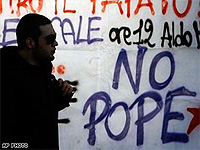 Times have changed, however -- no longer a Christian institution,
Times have changed, however -- no longer a Christian institution, 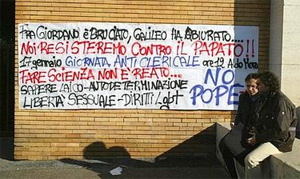
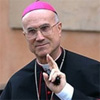 Responding to the protests of faculty members and students, Pope Benedict XVI cancels his appearance at Sapienza University.
Responding to the protests of faculty members and students, Pope Benedict XVI cancels his appearance at Sapienza University. 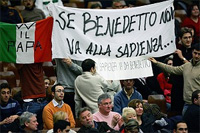

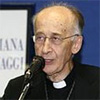 Calling the Sapienza protests a "painful blow to the entire city of Rome,"
Calling the Sapienza protests a "painful blow to the entire city of Rome," 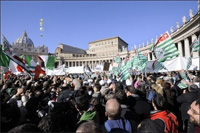 Agence France-Presse (AFP) reports that
Agence France-Presse (AFP) reports that 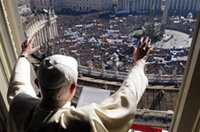
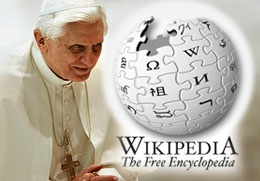 Update
Update 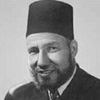 Hasan al Banna (1906-1949), Egyptian founder of the
Hasan al Banna (1906-1949), Egyptian founder of the 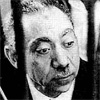 Sayyid Qutb (1903-1966), a leading intellectual in the Egyptian Muslim Brotherhood. Qutb believed that "the index of whether a state was truly Muslim was the degree to which sharia law prevailed," and stressed that those Muslims who failed to live an authentic Muslim life constituted a threat to Islam alongside Jews, Christians and unbelievers.
Sayyid Qutb (1903-1966), a leading intellectual in the Egyptian Muslim Brotherhood. Qutb believed that "the index of whether a state was truly Muslim was the degree to which sharia law prevailed," and stressed that those Muslims who failed to live an authentic Muslim life constituted a threat to Islam alongside Jews, Christians and unbelievers.
 Fr. Samir Khalil put it best:
Fr. Samir Khalil put it best: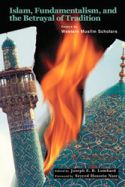
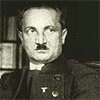 Safranski describes how the National Socialist Revolution had "electrified Heidegger philosophically". He perceived it as a metaphysical revolution, a "total overturning of our German Dasein"; breaking out from Plato's cave into authenticity and rebirth:
Safranski describes how the National Socialist Revolution had "electrified Heidegger philosophically". He perceived it as a metaphysical revolution, a "total overturning of our German Dasein"; breaking out from Plato's cave into authenticity and rebirth: In an interview with Liberation, which Johnson describes as "the most groveling account of the Soviet state by a major Western intellectual since the notorious expedition by George Bernard Shaw in the early 1930's," Sartre claimed Soviet citizens did not travel -- not because they were constrained from doing so, but because they had no desire to leave their marvellous country. Moreover, he insisted, "there is total freedom of criticism in the USSR.' Years later, Sartre admitted of this interview:
In an interview with Liberation, which Johnson describes as "the most groveling account of the Soviet state by a major Western intellectual since the notorious expedition by George Bernard Shaw in the early 1930's," Sartre claimed Soviet citizens did not travel -- not because they were constrained from doing so, but because they had no desire to leave their marvellous country. Moreover, he insisted, "there is total freedom of criticism in the USSR.' Years later, Sartre admitted of this interview:
 Just as Heidegger interpreted National Socialism through the "rose colored glasses" of his own philosophy and Sartre would display a fascination with Communism and Third World dictators in the revolutionary 60's, the French postmodernist Michael Foucault appears to have had a thing for the 1978 Iranian revolution. Or as
Just as Heidegger interpreted National Socialism through the "rose colored glasses" of his own philosophy and Sartre would display a fascination with Communism and Third World dictators in the revolutionary 60's, the French postmodernist Michael Foucault appears to have had a thing for the 1978 Iranian revolution. Or as 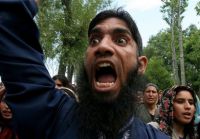
 In
In 












